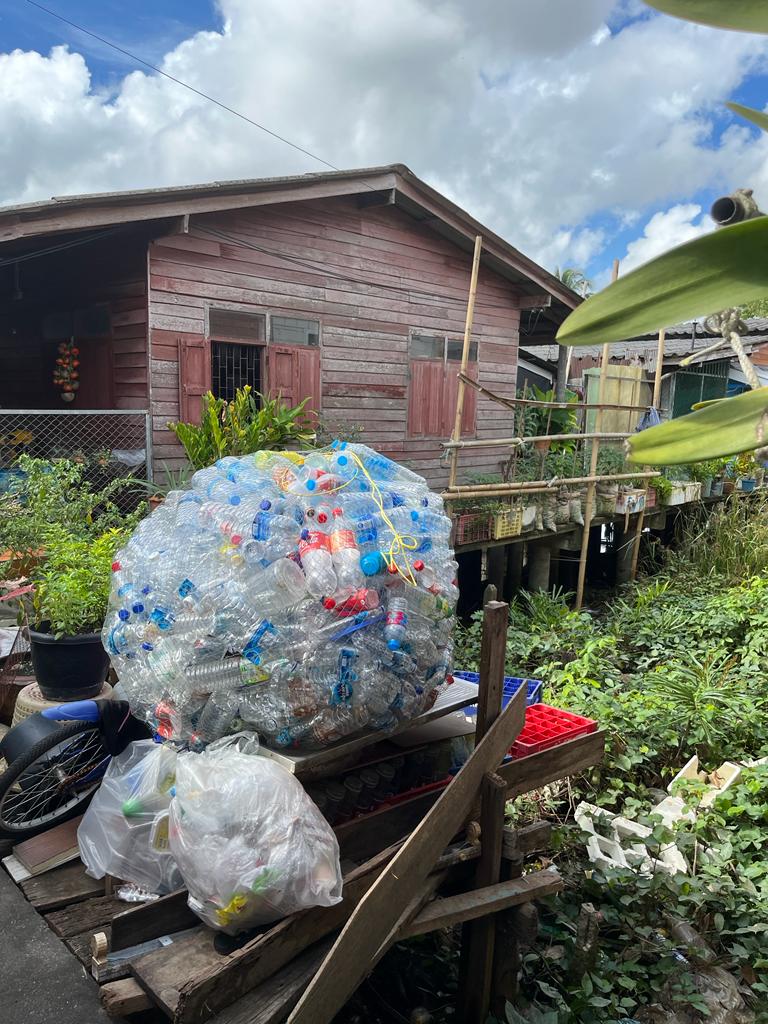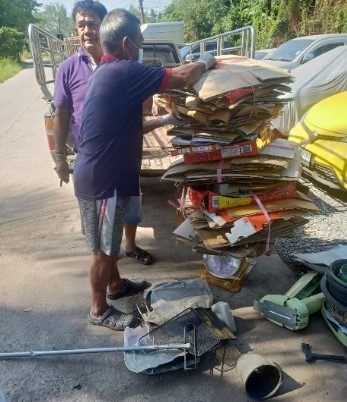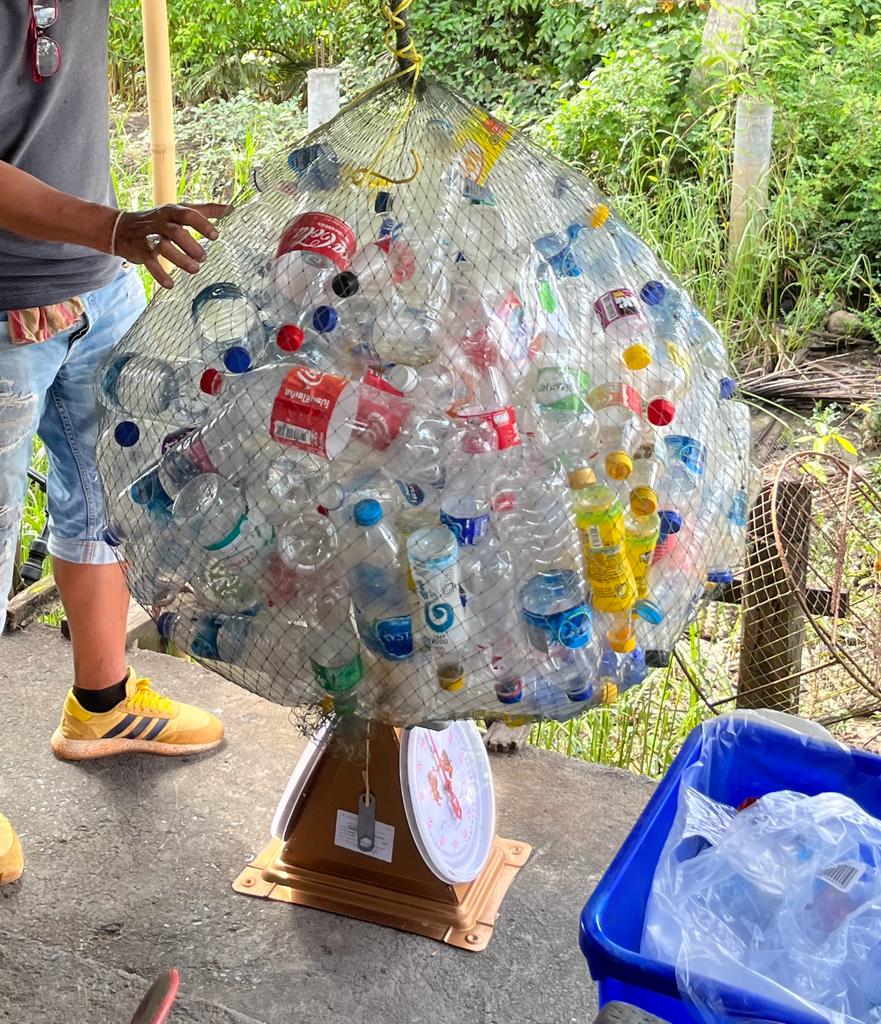The separation of waste at source is supported through the provision of segregation bins to collect recyclable waste, which is sold to recyclers – this intervention generates income for the community from waste sorting.
- City: Baan Bang Lha community, Surat Thani
- Country: Thailand
- Key Impact Area:
- Collect & Recycle
- Sub-Category: Community-based Waste Management; Collection; Recycling; Behavioural Change
- Key Terms: #wastebank #recycle #wastesorting #sourceseggregation #closetheloop
- Project Partners/Target Reach: Surat Thani Municipality, Baan Bang Lha community, Ranong Recycle Environment Social Enterprise
- Donor: TV-aksjonen (TVA), Norway
- Timeline: Dec 2022 – Dec 2024
KEY SUCCESSES
- WWF Thailand and the Surat Thani municipality collaborated to identify communities to support. Baan Bang Lha community showed potential with highly motivated leaders, allowing for sustainability.
- Baan Bang Lha community set up a waste collection system with a collection fee of 50 baht per month per household to increase the ease of proper waste disposal addressing the community’s accessibility challenges. About 34 households (11%) now contribute.
- WWF Thailand provided the community with three sets of segregation bins in December 2022 and training on how to maximise the value of waste, leading to improved waste segregation.
- Two community members were hired to collect waste using a provided trolley. They collect waste from the members’ houses every day and sort it at the main collection point (if not already sorted).
- WWF Thailand connected the community with a local junk shop. The municipality collects general waste twice daily, while recyclable waste that is separated using the bins is sold directly to the junk shop by a committed community leader.
As of November 2023, the community has sold recyclable waste to the junk shop five times, totalling 1,195 kilograms of recyclable waste (including 34%, 405.2kg of plastic), earning 7,015 baht. The money received from the sale is used as a fund to further organise the waste management system as well as fund community events.
BACKGROUND

Baan Bang Lha is a community of narrow pathways built on piles in the Tapee River that experiences garbage leakage into the sea. The community has 315 households and their knowledge of waste management was limited. They faced challenges with improper waste management as they did not have waste services. As such, before the intervention, there was virtually no separation of household waste – garbage was mostly dumped into general garbage bins without sorting or directly into the river. Only some households or stores would separate plastic bottles and sell them to junk shops.
Project/Intervention Objectives
- To support the separation of waste at source through the use of segregation bins to collect recyclable waste and generate additional income for the community from sales of recyclables.
- To change the waste separation behaviour of the community members to improve waste separation at the household level.
- To improve the waste management system within the community to enable smoother recycling of plastics.

INTERVENTION APPROACH
WWF Thailand works closely with the Surat Thani municipality to support Baan Bang Lha’s waste management system through the following:
- Development of a Community Waste Collection System: As Baan Bang Lha community leaders desire for their town to become a tourist attraction, they decided to clean up the area by setting up a waste collection system. They gathered the community to actively participate and raise funds through waste collection fees. A mobile waste bank concept where the community leader goes door-to-door to collect and sell recyclables has been piloted with the community.
- Provision of Waste Segregation Bins: WWF provided three sets of segregation bins to the Baan Bang Lha community in December 2022. Using these bins, waste is divided into four categories using segregation bins: plastic bottles, cardboard, glass bottles, and aluminium cans.
- Community Awareness Building & Monitoring: WWF staff and municipality staff regularly visit the community to follow up, provide guidance and trainings for community members to increase their knowledge of waste collection and segregation.
- Waste Collection: Community members were hired to collect waste from the members’ houses every day – using a trolley, waste is brought to the segregation bins, which acts as a storage centre for all waste. The municipal garbage truck picks up general waste from the bins twice a day. WWF also supported coordination with junkshops who buys recyclables at a fair price when the bins are filled. This intervention therefore enables income circulating within the community.

RESOURCES
- WWF Thailand & Ranong Recycle supported with:
- Providing three sets of segregation bins – this number was determined by the available budget, the number of households and space available within the community.
- Some equipment such as net bags for households to collect plastic waste, weighing scale, and a record book.
- Coordination support between the community, municipality and local social enterprises who are key partners in enabling the buy-in of the community, collection, and sale of recyclables.
- Community: a collection fee of 50 baht per household per month is in place to support the community waste collection system, including the hiring and equipping of two waste collectors per 50 households as well as hosting community awareness events.
- Municipality: supports with the initial connection & communication between WWF and the communities as well as twice daily pick up of waste and monitoring of the amount of waste recycled.
RESULTS
34 households (11%) contribute fees towards the community waste management system. After the community received segregation bins and trainings, this led to better waste disposal practices as villagers could visibly see the changes and value of waste, and started to separate household waste. As a result, the community is cleaner.
In addition, the waste that is separated from sorting bins is sold, generating additional income for the community. This income will be used to further develop the waste collection system within the community, through hiring and equipping plastic waste collectors for example. Currently, the community has sold recyclable waste to the junk shop five times, with a total of 1,195 kilograms (including 34%, 405.2 kg of plastic), earning 7,015 baht (see chart above).
Positive Outcomes/Impact
This activity provides a better waste collection system for the community as it previously did not have waste segregation bins nearby, and reduces the amount of waste disposed of in landfills. It also generates income for the community by recycling and sorting waste. Over time, with more villagers aware of the community collection initiative, more started sorting waste and bins started filling up faster than before. Selling recyclables is also another way to save the cost of municipal waste disposal for municipalities.
CHALLENGES
- Environmental challenges: As the community is located on the river, there is not only waste generated from the community households, but also waste that flows into the community by the river. These wastes are considered transboundary pollution, which adds a burden to the Baan Bang Lha community waste management.
- Social challenges: There are also members from other communities who use the new bins and dump unsorted, contaminated waste. There was also an issue of land ownership where the community was not comfortable with using their limited space to set up a warehouse to collect waste – therefore, segregation bins were set up instead.
- Economic challenges: The selling price of recycled waste is quite unstable and fluctuates slightly – these factors are beyond the control of the community so the selling price is checked with the junk shop before each sale.
REPLICATING & SCALING
The community sorting and waste bank model can be extended to other communities by,
- Working with the municipality to identify communities with a plastic leakage issue and motivated leaders;
- Supporting with the provision of segregation bins and connection with buyers/recyclers; and
- Implementing a public relations plan for the community waste collection system, including waste collection fees and waste separation trainings to increase awareness about sorting and maximising the value of waste.
Enabling Factors
A key factor supporting this model is the strength and attention of community leaders, who are the disseminators of activities and community engagement, which are important to the compliance of the community for a successful waste collection and recycling system.
SUSTAINABILITY
To sustain this initiative, there needs to be cooperation amongst everyone in the community, including government agencies. More education on waste sorting, maximising the value of waste, and finding alternative waste dealers is needed. More kinds of recyclable waste should be collected and fair purchase prices are essential to encourage the society to continue recycling. Waste collection fees may be lowered in the future as the community will have income from sales. Additionally, setting up a community waste bank committee to operate the transactions and manage the income will ensure financial sustainability and that members receive benefits equally.
RECOMMENDATIONS
- WWF to continue working with municipalities to foster the strength and attention of community leaders as they are important factors in promoting the success of activities within the community.
- In the process of designing and planning activities, WWF to work closely with the community to co-design activities that are suitable for their context and solve the problems rooted in the community.
- For sustainability, gain community members’ recognition of the benefits and values of the activities so as to promote the success of cooperation. Continue to do the following:
- Provide incentives to the community, such as net bags;
- Community to use funds from sales of recyclable waste for annual dividends, supporting community events, or develop a savings system for members to grow interest; and
- Capacity strengthening, such as training in waste sorting to generate income, to encourage local people to join.


